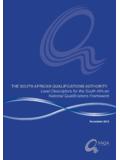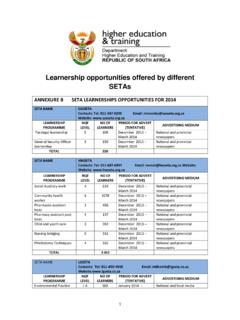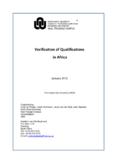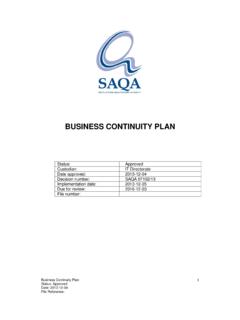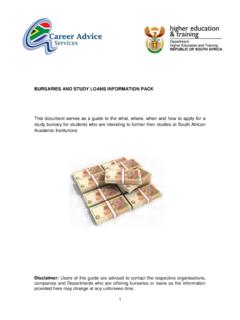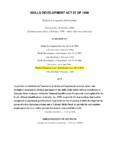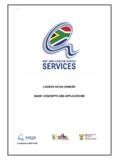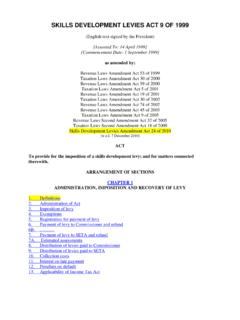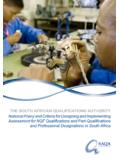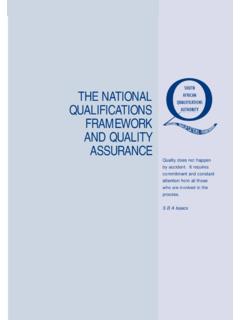Transcription of Criteria and Guidelines for Short Courses and Skills ...
1 GUIDELINE DOCUMENTC riteria and Guidelines for Short Courses andSkills ProgrammesProviders of Short learningprogrammes have a critical roleto play in the resource-efficientdelivery of, and in facilitatingflexible access to lifelonglearning opportunities for thedevelopment of a 21st centuryworkforce (p. 33)Please refer any queries in writing to:The Executive OfficerSAQAA ttention: The Director; Quality Assurance and DevelopmentRE: Criteria and Guidelines for Short Courses and Skills Programmes Postnet Suite 248 Private Bag X06 WATERKLOOF0145 PretoriaSOUTH AFRICATel: (012) 431 5131 Fax: (012) 431 5145e-mail: date: June 2004 ISBN: 0-9584572-3-9 CopyrightAll rights reserved.
2 No part of this publication may be reproduced, stored in a retrieval sys-tem, or transmitted in any form or by any means, electronic, mechanical, photocopying,recording, or otherwise, without prior written permission of the South AfricanQualifications Authority (SAQA).Funded by the European Union under the EuropeanProgramme for Reconstructionand DevelopmentThe views expressed in this documentare not necessarily those of the and Guidelinesfor Short Courses andSkills ProgrammesTHE SOUTH AFRICAN QUALIFICATIONS AUTHORITYT able of ContentsAcronyms used in this document4 Executive summary5 Chapter 1 Status of recorded Short Consultative process10 Chapter 2: Short course Registration and Short Courses and Skills programmes13 Chapter 3.
3 Models for Criteria for Categories of The one provider, one ETQA Models for accreditation25 Chapter 4:Policy Acts, regulations and policies30 Chapter 5:RPL and lifelong Short learning programmes and Short learning programmes and lifelong learning32 Conclusion33 List of sources34 Appendix A:Memorandum of understanding35 Appendix B: Skills development regulations guidelines37 Appendix C:Extracts from An Interdependent National Qualifications Framework System. Consultative Document42 List of figures and tables:Figure 1: Registration11 Figure 2: Accreditation13 Figure 3: Credit-bearing versus non-credit-bearing programmes17 Figure 4: Short learning programmes within the framework of a particular qualification18 Figure 5: Accreditation/approval28 Table 1.
4 Training activities of the DoL between 1982 and 199831 Acronyms used in this documentACEA dvanced Certificate in EducationCHEC ouncil on Higher EducationDoEDepartment of EducationDoLDepartment of LabourETQAE ducation and Training Quality Assurance BodyHI-EDQC (proposed) Higher Education and Training Qualifications and Quality Assurance CouncilHRDSH uman Resource Development StrategyHSRCH uman Sciences Research CouncilMoUMemorandum of UnderstandingNAP(draft) A New Academic Policy for Programmes and Qualifications inHigher EducationNLRDN ational Learners Records DatabaseNQFN ational Qualifications FrameworkNSBN ational Standards BodyNSDSN ational Skills Development StrategyNSPN ational Skills PlanOBEO utcomes-based educationQCQualifications and Quality Assurance CouncilRPLR ecognition of Prior LearningSAQAS outh African Qualifications AuthoritySDFS kills Development FacilitatorSETAS ector Education and Training AuthoritySGBS tandards Generating BodySMMES mall-, medium - and micro EnterpriseSSPS ector Skills PlanTOP(proposed)
5 Trade, Occupational and ProfessionalQualifications and Quality Assurance CouncilTUPT raining of Unemployed PersonsWSIPW orkplace Skills Implementation PlanWSPW orkplace Skills PlanDIRECTORATE: QUALITYASSURANCE ANDDEVELOPMENT4 Criteria and Guidelines for Short Courses and Skills ProgrammesCriteria and Guidelines for Short Courses and Skills Programmes5 Executive summaryShort course provisioning is one of the most dynamic features of the emerging educationand training system of South Africa. This kind of provisioning is particularly associatedwith just in time , and just enough learning to meet a specific need in workplaceenvironments.
6 Therefore, it is considered a viable and common method for optimal workplacefunctioning in all contexts and greatly facilitates access to learning in a manageable manner interms of cost, time, energy and resources, for both the employer and addition, Short course provisioning has a wider focus than workplace contexts: whereresearch findings are disseminated and new knowledge is shared, it is also associated withcontinuing professional development. A third area where Short course provisioning is important is where learners require a targetedshort learning programme, to upgrade Skills and knowledge to ensure success in their chosenfield of the new approach to education and training, Short course provisioning has a veryparticular place in the system and has an important role to play in the development, up-skillingand multi-skilling of human resources.
7 It is clear that it is relevant to all sectors and bands andit is therefore critical that it should be subject to the accreditation and quality assuranceprocesses already in place for education and training providers of full qualifications; who are offering a learning programme that will ensure that a learner is awardedwith a certificate, diploma, degree, of the contexts where this kind of provisioning occur include: teacher development through In-service training programmes; human resources management where updates to Acts have an impact on the humanresource function of an organisation; hands-on learning as part of a full qualification; new knowledge generated in a particular situation where this will impact operationally onan organisation or profession and where this type of knowledge has not yet been includedin a qualification; and refresher Courses for professionals, of this nature will assist workplaces to develop meaningful career and learningpathways for their employees in a highly accessible manner.
8 However, there is the real dangerthat this type of provisioning may result in disjointed and fragmented approaches and it istherefore important that designers of such learning programmes include a focus on theteaching and learning assumptions and the proposed approaches, in the interest of the learner;and, where required, ensure that credits achieved through Short Courses are articulated andhave currency in terms of registered qualifications and unit standards. If so, this may lead toimproved workplace practice and to improved employability and mobility of the need for this document stems from the lack of clarity about Short course provisioning andthe formalisation of a mode of delivery, which has been, up to now, an informal andunregulated area of education and training.
9 However, this does not say that all Short courseprovisioning necessarily needs regulation, but where such provisioning impacts on publicmoney expenditure and on the awarding of credits towards registered unit standards andqualifications, it clearly needs quality assurance. Short learning programmes that will not carrycredits towards registered unit standards and qualifications do not fall within the ambit of theresponsibility of the South African Qualifications Authority. This document therefore hopes to clarify and formalise Short course provisioning so that it cantake its rightful place in the development of this country s human Criteria and Guidelines for Short Courses and Skills Programmes is not a stand-alonedocument as it supports other SAQA documents dealing with accreditation and qualityassurance of providers of education and training.
10 The following documents are assumed to befamiliar to the reader1: ETQA Regulations Criteria and Guidelines for Providers Quality Management Systems for Education and Training ProvidersDIRECTORATE: QUALITYASSURANCE ANDDEVELOPMENT6 Criteria and Guidelines for Short Courses and Skills Programmes1 For more information and the full text of these documents, please visit 1 Status of recorded Short coursesIn 2000 the South African Qualifications Authority (SAQA) initiated the recording of shortcourses to enable providers of Short Courses to be brought into the standard-setting and quality-assurance processes set up for the education and training system as a whole.
